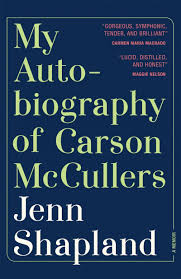An interview with Jenn Shapland at Bookforum:
 I struggle with biography as a genre, because I’m deeply interested in life writing, but allergic to anything that starts with “So-and-so was born in 1946.” Who is this third person claiming omniscience about someone else’s life? Why must we begin with birth, which no one remembers, or with ancestors, and move chronologically? The written record about Carson tries to sandwich her into a conventional, straight biography, wherein a person is born, comes of age, marries, and dies. That’s just not how her life went, or that’s not a way to capture the really exciting stuff, like her relationships with women that happened while she was married, her getting divorced and remarrying and abandoning the same guy, living with the queer cadre at February House, meeting Mary Mercer in her forties and falling in love, coming of age late in life. Queer narratives are all over the place, and queer people frequently take a long time to figure shit out. They live many lives in the space of one life, often with different identities, genders, pronouns, bodies, and styles. Queer narratives demand new forms, and I would love to see more queer writing that fucks with all different genres and literary conventions.
I struggle with biography as a genre, because I’m deeply interested in life writing, but allergic to anything that starts with “So-and-so was born in 1946.” Who is this third person claiming omniscience about someone else’s life? Why must we begin with birth, which no one remembers, or with ancestors, and move chronologically? The written record about Carson tries to sandwich her into a conventional, straight biography, wherein a person is born, comes of age, marries, and dies. That’s just not how her life went, or that’s not a way to capture the really exciting stuff, like her relationships with women that happened while she was married, her getting divorced and remarrying and abandoning the same guy, living with the queer cadre at February House, meeting Mary Mercer in her forties and falling in love, coming of age late in life. Queer narratives are all over the place, and queer people frequently take a long time to figure shit out. They live many lives in the space of one life, often with different identities, genders, pronouns, bodies, and styles. Queer narratives demand new forms, and I would love to see more queer writing that fucks with all different genres and literary conventions.
more here.
